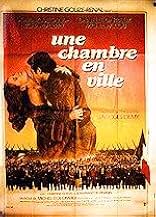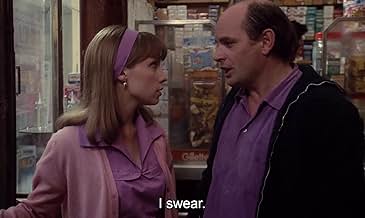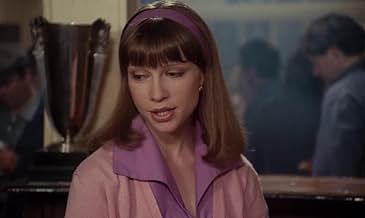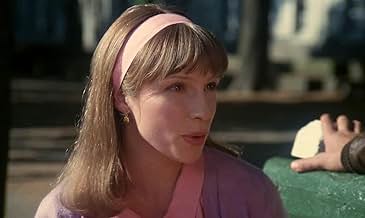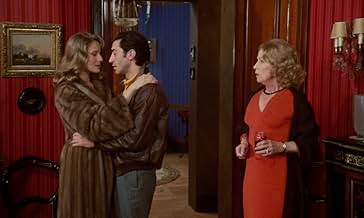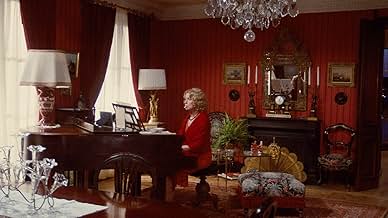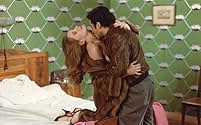IMDb-BEWERTUNG
6,7/10
1778
IHRE BEWERTUNG
Füge eine Handlung in deiner Sprache hinzuAmid an ongoing workers' strike, a steelworker falls in love with the daughter of his baroness landlady, even though both are already in relationships.Amid an ongoing workers' strike, a steelworker falls in love with the daughter of his baroness landlady, even though both are already in relationships.Amid an ongoing workers' strike, a steelworker falls in love with the daughter of his baroness landlady, even though both are already in relationships.
- Auszeichnungen
- 3 Gewinne & 10 Nominierungen insgesamt
Florence Davis
- Edith
- (Gesang)
Empfohlene Bewertungen
10daflauta
Could be a sequence, although dealing with a different story, to Jacques Demy's Les Parapluies de Cherbourg. All the dialogues are sung by the excellent vocal team gathered once more by the director (see also Les Demoiselles de Rochefort, Peau d'Ane). Musical style this time completely different, by competent Michel Colombier, provides fluent and dramatic tension all over. Who is going to make such well-finished films from now on?
How I never saw this movie and when the first line was spoken in singing way, I realize be treat a musical, not a classic musical as we get used to, just sung in every line, well it really weird to watch a movie, I love the ultimate musical "Les Miserables", taking in account the level of the budge they differ each other so much, "Une Chamble en Ville" is a small production a slow pace, sometimes still boring, nevertheless the story is great, the tragic tale took place at Nantes, during shipyard's strike (Which the French people loves to do) a humble worker François (Richard Berry) rent a room from a former Countess Margot (Danielle Darrieux) she has an unsatisfied married daughter Edith (Dominique Sanda in bold nudes scenes) due her husband Edmond (Michel Piccoli) actually is sexually impotent, in other hand François has been dating with Violette, who was pregnancy from him without notice by him, in fact François didn't love her, when he meets Edith the chemistry is overpowering and ends up in love night at cheap hotel, then all these facts are interwoven each other, a tragic tale sang on every line, fine movie, although it wasn't allowed to everyone!!!
Resume:
First watch: 2020 / How many: 1 / Source: DVD / Rating: 7.25
Resume:
First watch: 2020 / How many: 1 / Source: DVD / Rating: 7.25
I had thought Jacques Demy had abandoned his movie operas after the 1960s, but no, he hadn't, and here's the proof. He's working with Colombier instead of LeGrand, and there's a lot more recitative, but unlike others who have tried to translate opera onto the screen, he has cinematographer Jean Penzer shoot it like a movie.... although Mme. Darrieux's flat does look like a stage design.
I do wonder if her daughter is wearing only a fur coat, as the dialogue indicates.
I do wonder if her daughter is wearing only a fur coat, as the dialogue indicates.
Workers during a strike prepare and perform a demonstration, and two personal relations develop against this background. François (Richard Berry) abandons his pregnant girlfriend Violette (Fabienne Guyon, appropriately dressed in violet), and meets a very beautiful upper class girl, Edith (Dominique Sanda).
This was my first experience with Jacques Demy, and I was immediately smitten. The backdrop recalls something like "Les Miserables", based on Demy's own witnessing of a shipyard strike, though the focus here is much more on the love triangle, and Francois Guilbard is not the tragic character that Jean Valjean is (in fact, Francois is kind of a rat).
Musicals are not my favorite genre, but I think this was done right... every line sounds amazing, and it works to have it done without any speaking. The dark themes even hark back to classic operas more than the saccharine musicals of modern Hollywood. Where the plot may be less than perfect, it is made up for by the mere presence of such striking and talented actors.
Unfortunately for Demy, many consider his best years 1961-1967, with the exception of "Donkey Skin" (1970) and completely disregard this film. Despite being nominated for nine Cesars (basically the French Oscars), it won none of them.
This was my first experience with Jacques Demy, and I was immediately smitten. The backdrop recalls something like "Les Miserables", based on Demy's own witnessing of a shipyard strike, though the focus here is much more on the love triangle, and Francois Guilbard is not the tragic character that Jean Valjean is (in fact, Francois is kind of a rat).
Musicals are not my favorite genre, but I think this was done right... every line sounds amazing, and it works to have it done without any speaking. The dark themes even hark back to classic operas more than the saccharine musicals of modern Hollywood. Where the plot may be less than perfect, it is made up for by the mere presence of such striking and talented actors.
Unfortunately for Demy, many consider his best years 1961-1967, with the exception of "Donkey Skin" (1970) and completely disregard this film. Despite being nominated for nine Cesars (basically the French Oscars), it won none of them.
I don't know what it was I expected from this film based on the premise, but by golly, it's not the movie I got. And I am so, so happy about that.
At its core this is a romantic drama set against the backdrop of unrest in Nantes as workers strike and the stooges of the establishment (some euphemistically call them police) enforce state violence. The story is built on very familiar ideas that we've seen in countless other romantic dramas before, and have since, and will again: a troubled landlady, a loveless and even abusive marriage, a relationship on the rocks, external factors adding to hardship, a beleaguered protagonist. That Jacques Demy penned this with a mind for including all this and more inherently places upper limits on suspension of disbelief and fosters the feeling of melodrama. Take into account the fact that one character is wearing nothing but a large overcoat for most of the length (at least twenty-four hours in-universe), the fact that the central romance is the result of a chance encounter and takes the course that it does, and final story beats in the last several minutes that I simply could not believe were actually what Demy consciously selected, and "melodrama" becomes an understatement. The best point of comparison is actually the soap opera, the peak of unending dramatic turns and over the top storytelling (unless you hop over to the next mountain range where Lifetime Original Movies and Horror or Sci-Fi B-Movies claim dominion). And not only is 'Une chambre en ville' a soap opera, but it's one in which every single line of dialogue is sung! It's not even that this adopts the recognizable structure of the average musical or opera, in which dialogue (whether spoken or sung) is interspersed among distinct songs or numbers; rather, this is just a romantic drama in which all lines are sung.
I don't think it's unfair to wonder if this really was exactly what Demy had intended from the get-go, but when you stop to think about it I can't imagine it was anything but. Such as it is the narrative is relatively unsophisticated and straightforward, and this and musical bent definitely amplify the sense of inauthenticity about the whole affair. At the same time, this was built from the ground up with absolute sincerity. The cast give genuinely admirable performances, with Dominique Sanda, Danielle Darrieux, Richard Berry, Jean-Francois Stévenin, and Fabienne Guyon (among others) standing out above even a notable figure like Michel Piccoli. The sets, filming locations, costume design, hair, makeup, stunts, and effects are truly outstanding, as fine as one could hope from most any picture. Though it sticks to the background behind the actors' singing, Michel Colombier's music is easy on the ears; Demy's direction and Jean Penzer's cinematography are rock solid, building shots and scenes with an undeniable expertise. Even for the slant that it ultimately follows, and the inclusion of plot points so tried and true they're basically tropes, Demy's writing - like all else here - could have just as easily been the foundation for an honest, serious drama. And yet all this was instead warped into a cheeky form that practically winks at the audience. There's no reason this should work as well as it does; indeed, I found myself filled with doubts at various points, given the overload of melodrama on hand. Yet as the finale irrevocably affirms how wholeheartedly Demy leaned into the bluster, I'd be plainly lying if I said I wasn't charmed.
'Une chambre en ville' is actually completely outrageous, a concept taken to a ham-fisted extreme that by all reason couldn't and shouldn't hold water. Nevertheless, it's wonderfully well made in every capacity, with the cast and crew having made excellent contributions. And while the overall tack is surely one that inspires love or hate with no middle ground, I for one am totally delighted by the end result. It's definitely a bit of a weird hodgepodge, but even for those who can't abide what Demy is doing here, I don't think there's much arguing that it's entertaining, whether in the best or worst of ways. I find myself conflicted; I don't know if it would be better for potential viewers to be well aware of what they're getting into with this, so as to prepare themselves, or if folks are better off being caught unaware as I was. All I know for sure is that I had a great time watching, and I would happily recommend 'Une chambre en ville' to just about anyone. It's a strange ride in some measure, but one that's very much worth taking.
At its core this is a romantic drama set against the backdrop of unrest in Nantes as workers strike and the stooges of the establishment (some euphemistically call them police) enforce state violence. The story is built on very familiar ideas that we've seen in countless other romantic dramas before, and have since, and will again: a troubled landlady, a loveless and even abusive marriage, a relationship on the rocks, external factors adding to hardship, a beleaguered protagonist. That Jacques Demy penned this with a mind for including all this and more inherently places upper limits on suspension of disbelief and fosters the feeling of melodrama. Take into account the fact that one character is wearing nothing but a large overcoat for most of the length (at least twenty-four hours in-universe), the fact that the central romance is the result of a chance encounter and takes the course that it does, and final story beats in the last several minutes that I simply could not believe were actually what Demy consciously selected, and "melodrama" becomes an understatement. The best point of comparison is actually the soap opera, the peak of unending dramatic turns and over the top storytelling (unless you hop over to the next mountain range where Lifetime Original Movies and Horror or Sci-Fi B-Movies claim dominion). And not only is 'Une chambre en ville' a soap opera, but it's one in which every single line of dialogue is sung! It's not even that this adopts the recognizable structure of the average musical or opera, in which dialogue (whether spoken or sung) is interspersed among distinct songs or numbers; rather, this is just a romantic drama in which all lines are sung.
I don't think it's unfair to wonder if this really was exactly what Demy had intended from the get-go, but when you stop to think about it I can't imagine it was anything but. Such as it is the narrative is relatively unsophisticated and straightforward, and this and musical bent definitely amplify the sense of inauthenticity about the whole affair. At the same time, this was built from the ground up with absolute sincerity. The cast give genuinely admirable performances, with Dominique Sanda, Danielle Darrieux, Richard Berry, Jean-Francois Stévenin, and Fabienne Guyon (among others) standing out above even a notable figure like Michel Piccoli. The sets, filming locations, costume design, hair, makeup, stunts, and effects are truly outstanding, as fine as one could hope from most any picture. Though it sticks to the background behind the actors' singing, Michel Colombier's music is easy on the ears; Demy's direction and Jean Penzer's cinematography are rock solid, building shots and scenes with an undeniable expertise. Even for the slant that it ultimately follows, and the inclusion of plot points so tried and true they're basically tropes, Demy's writing - like all else here - could have just as easily been the foundation for an honest, serious drama. And yet all this was instead warped into a cheeky form that practically winks at the audience. There's no reason this should work as well as it does; indeed, I found myself filled with doubts at various points, given the overload of melodrama on hand. Yet as the finale irrevocably affirms how wholeheartedly Demy leaned into the bluster, I'd be plainly lying if I said I wasn't charmed.
'Une chambre en ville' is actually completely outrageous, a concept taken to a ham-fisted extreme that by all reason couldn't and shouldn't hold water. Nevertheless, it's wonderfully well made in every capacity, with the cast and crew having made excellent contributions. And while the overall tack is surely one that inspires love or hate with no middle ground, I for one am totally delighted by the end result. It's definitely a bit of a weird hodgepodge, but even for those who can't abide what Demy is doing here, I don't think there's much arguing that it's entertaining, whether in the best or worst of ways. I find myself conflicted; I don't know if it would be better for potential viewers to be well aware of what they're getting into with this, so as to prepare themselves, or if folks are better off being caught unaware as I was. All I know for sure is that I had a great time watching, and I would happily recommend 'Une chambre en ville' to just about anyone. It's a strange ride in some measure, but one that's very much worth taking.
Wusstest du schon
- WissenswertesDemy's longtime collaborator, composer Michel Legrand, strongly opposed the movie's social themes and urged the director to not do the movie. He ended up not being associated with the movie at all, and even in the 2010s, he was still trashing the movie in interviews.
- PatzerAround 01:11:53, Edith is holding a fire gun. Around 01:11:57, Edith is holding her bag and puts a tissue around her hand. However, she hasn't received a razor cut.
- Zitate
Madame Pelletier: [singing] You worry too much about me. Think of yourself first, of your own life. I've lived mine.
- VerbindungenFeatured in Jacquot de Nantes (1991)
Top-Auswahl
Melde dich zum Bewerten an und greife auf die Watchlist für personalisierte Empfehlungen zu.
- How long is A Room in Town?Powered by Alexa
Details
- Erscheinungsdatum
- Herkunftsland
- Sprache
- Auch bekannt als
- A Room in Town
- Drehorte
- Place du Commerce, Nantes, Loire Atlantique, Frankreich(Where Violette goes to look for Guilbaud)
- Produktionsfirmen
- Weitere beteiligte Unternehmen bei IMDbPro anzeigen
- Laufzeit1 Stunde 30 Minuten
- Farbe
- Sound-Mix
- Seitenverhältnis
- 1.66 : 1
Zu dieser Seite beitragen
Bearbeitung vorschlagen oder fehlenden Inhalt hinzufügen

Oberste Lücke
By what name was Ein Zimmer in der Stadt (1982) officially released in Canada in English?
Antwort
![Bande-annonce [OV]](https://m.media-amazon.com/images/M/MV5BZGRhNTBmNzItZGNjMS00N2Y4LTkwODgtZjhjNTUxYjBiZmJmXkEyXkFqcGdeQXRyYW5zY29kZS13b3JrZmxvdw@@._V1_QL75_UX500_CR0)
